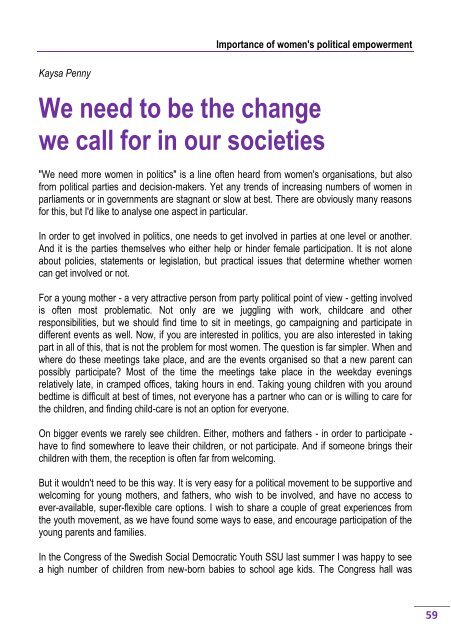Importance of women's political empowerement - Gurmai Zita
Importance of women's political empowerement - Gurmai Zita
Importance of women's political empowerement - Gurmai Zita
You also want an ePaper? Increase the reach of your titles
YUMPU automatically turns print PDFs into web optimized ePapers that Google loves.
Kaysa Penny<br />
<strong>Importance</strong> <strong>of</strong> <strong>women's</strong> <strong>political</strong> empowerment<br />
We need to be the change<br />
we call for in our societies<br />
"We need more women in politics" is a line <strong>of</strong>ten heard from <strong>women's</strong> organisations, but also<br />
from <strong>political</strong> parties and decision-makers. Yet any trends <strong>of</strong> increasing numbers <strong>of</strong> women in<br />
parliaments or in governments are stagnant or slow at best. There are obviously many reasons<br />
for this, but I'd like to analyse one aspect in particular.<br />
In order to get involved in politics, one needs to get involved in parties at one level or another.<br />
And it is the parties themselves who either help or hinder female participation. It is not alone<br />
about policies, statements or legislation, but practical issues that determine whether women<br />
can get involved or not.<br />
For a young mother - a very attractive person from party <strong>political</strong> point <strong>of</strong> view - getting involved<br />
is <strong>of</strong>ten most problematic. Not only are we juggling with work, childcare and other<br />
responsibilities, but we should find time to sit in meetings, go campaigning and participate in<br />
different events as well. Now, if you are interested in politics, you are also interested in taking<br />
part in all <strong>of</strong> this, that is not the problem for most women. The question is far simpler. When and<br />
where do these meetings take place, and are the events organised so that a new parent can<br />
possibly participate? Most <strong>of</strong> the time the meetings take place in the weekday evenings<br />
relatively late, in cramped <strong>of</strong>fices, taking hours in end. Taking young children with you around<br />
bedtime is difficult at best <strong>of</strong> times, not everyone has a partner who can or is willing to care for<br />
the children, and finding child-care is not an option for everyone.<br />
On bigger events we rarely see children. Either, mothers and fathers - in order to participate -<br />
have to find somewhere to leave their children, or not participate. And if someone brings their<br />
children with them, the reception is <strong>of</strong>ten far from welcoming.<br />
But it wouldn't need to be this way. It is very easy for a <strong>political</strong> movement to be supportive and<br />
welcoming for young mothers, and fathers, who wish to be involved, and have no access to<br />
ever-available, super-flexible care options. I wish to share a couple <strong>of</strong> great experiences from<br />
the youth movement, as we have found some ways to ease, and encourage participation <strong>of</strong> the<br />
young parents and families.<br />
In the Congress <strong>of</strong> the Swedish Social Democratic Youth SSU last summer I was happy to see<br />
a high number <strong>of</strong> children from new-born babies to school age kids. The Congress hall was<br />
59



